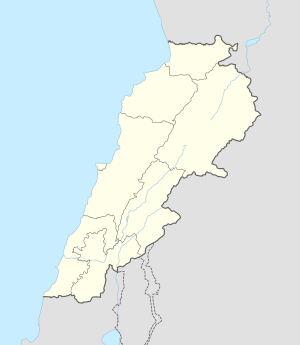Nahle, Lebanon
Nahlé | |
|---|---|
Village | |
 | |
| Country | |
| Governorate | Baalbek-Hermel |
| District | Baalbek |
نحله | |
| Location | 6 kilometres (3.7 mi) northeast of Baalbek |
|---|---|
| Region | Baalbek |
| Coordinates | 34°03′30″N 36°17′58″E / 34.05833°N 36.29944°E |
| History | |
| Cultures | Roman |
| Site notes | |
| Condition | Ruins |
| Public access | Yes |
Nahlé (Arabic: نحله Nahlah), is a village situated 6 kilometres (3.7 mi) northeast of Baalbek in Baalbek District, Baalbek-Hermel Governorate, Lebanon.[1] It has the ruins of a Roman temple.
Name
[edit]The Lebanese town of Nahlé derives its name from the Arabic word “نحلة” (Nahleh), meaning “honeybee.” This interpretation reflects a connection to nature, potentially emphasizing the industrious and community-oriented qualities associated with bees. Additionally, Nahlé is known for its ancient history, including Roman-era ruins, suggesting that the name could also carry historical or cultural significance tied to its origins.
History
[edit]Nahle was probably founded during Roman rule of the region, that was called in the first century Roman Phoenicia.[citation needed]
The 13th-century geographer Yaqut al-Hamawi listed Nahlah in his geographical dictionary, with its entry being "a village lying 3 miles from Ba'labakk".[2]
In 1838, Eli Smith noted Nahleh as a Metawileh village in the Baalbek area.[3] Actually Nahle is located above a valley.[citation needed]
Roman temple
[edit]There are the ruins of a Roman temple in the village that are included in a group of Temples of the Beqaa Valley.[4]
The temple foundations are made of gigantic blocks of stone, upon which sit the remains of a podium. The podium has a long inscription written on it that is now almost impossible to read.[1] The huge foundations indicate that there was a huge temple over these foundations during Roman centuries.[5]
This sanctuary consisted of two parts: an open air court and a large room with a ceiling where notches for the wooden beam still exist. Only a few courses of stone are still standing.[citation needed]
References
[edit]- ^ a b George Taylor (1967). The Roman temples of Lebanon: a pictorial guide. Dar el-Machreq Publishers. Retrieved 27 October 2012.
- ^ Le Strange, Guy (1890). Palestine Under the Moslems. London: A. P. Watt. p. 514. Retrieved 13 February 2022.
- ^ Robinson and Smith, 1841, vol 3, 2nd appendix, p. 145
- ^ Othmar Keel (1997). The Symbolism of the Biblical World: Ancient Near Eastern Iconography and the Book of Psalms. Eisenbrauns. pp. 159–. ISBN 978-1-57506-014-9. Retrieved 27 October 2012.
- ^ Nahle Roman temple
Bibliography
[edit]External links
[edit]- Nahleh, Localiban
- Photo of the Nahle Valley on the website of the American University of Beirut
- Photo of Nahle temple on the website of the American University of Beirut
- Nahle on travelingluck.com
- Nahle on Wikimapia
- Nahle on lebanon.com
- Nahle on middleeast.com
- Picture of Nahle temple foundation stones on alblebanon.com
- Picture of Nahle temple foundation stones on alblebanon.com


